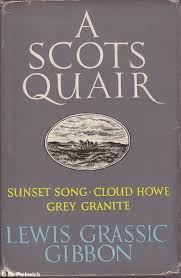Inspiring Older Readers
 posted on 06 Jul 2016
posted on 06 Jul 2016
The Archaeology of Working Class Writing : Part Four – Leslie Mitchell (Lewis Grassic Gibbon)
With a pen name like Lewis Grassic Gibbon ( a name derived from his mother’s side of the family) you would be excused for thinking that one of Scotland’s greatest writers of the early 20th century would be better known than he is. In reality, Gibbon’s relative obscurity probably comes down to a combination of factors – he died very young (only 33); he was a militant and committed socialist; and, he was from an agricultural working class background with few privileges.
Born David Leslie Mitchell in the same year Queen Victoria died in 1901, he was the son of an Aberdeenshire crofter and educated in a culture that believed schooling was simply an interference with preparing the child for a life of strenuous hard graft in the fields. But it seems Mitchell was a reader by instinct and would do what he could to get his hands on books and pamphlets despite opposition from family and institutions alike. He eventually ran away from home at the age of 16 to Aberdeen where he became a cub reporter and a socialist activist in the local trades council.
He moved to Glasgow to work on the Farmer’s Weekly but found himself out of a job and blacklisted for falsifying expenses that he was donating to the emerging British Socialist Party. Left with few alternatives Mitchell joined the army in which he served until 1928. On returning to civilian life he married and settled in Welwyn Garden City and was determined to become a professional writer – although he struggled to find anyone prepared to take his stories and articles.
By this time his identity as Lewis Grassic Gibbon was firmly established and he was about to enter what the critic and political activist Paul Foot described as his ‘purple passage’. He had novels published in 1928 and 1929 and then had something of a breakthrough with his Spartacus – the story of the revolt of a Thracian slave whose actions had also inspired Karl Marx. However, it was in the years between 1932-1934 that he produced his defining work, A Scots Quair.
The book is in fact a trilogy of novels – Sunset Song, Cloud Howe and Grey Granite – and the sweep of the subject matter is truly ambitious. Bill Clegg writing in The Independent in 2015 says this of it:
I got swept into the story of young Chris Guthrie and didn't step away until 700 pages later. Her story is that of Scotland in the 20th century and with sentences that (..) were nothing short of thrilling to read, the novel traces love and loss, war and politics, family and anger and everything in between. And though it has majestic metaphors (for example in Cloud Howe there is a passage about how religion and politics, patriotism and love are all "clouds that swept through the Howe of the world, with men that took them for gods"), the novels have a great sense of humour. That flinty Scottish wit – which I experienced first in the books and later recognised when I studied there –flies off the pages in dark sparks. I re-read the trilogy when I was studying in Stirling and understood much more of the language, and I have read it again a few times since and each time it holds up and offers something new.
Mitchell (Gibbon) died unexpectedly of peritonitis in 1935 and so A Scots Quair became his lasting legacy – and most especially the creation of Chris Guthrie, a female character to rival any other in British literary history.
Although there is now a centre just outside Aberdeen that is dedicated to Gibbon (http://www.grassicgibbon.com/index.html) he still doesn’t, in my view, get the sort of profile his ground-breaking writing and his life story demand. He comes from a time when being an artist and being politically committed were not just compatible but a duty and Gibbon’s politics and how they informed his writing were forged in the furnace of his working class reality. The fact that he wrote in what was a sometimes unusual hybrid between English and Scots dialect does make him hard to tune in to at first but with a little perseverance the music of the style and language soon becomes approachable and a positive pleasure ( just try reading it out loud to yourself at first – it works).
We should be talking about Mitchell/Gibbon as a giant of working class culture and although within some literary circles his talent is acknowledged, I hope one day he will get the wider recognition he deserves.
Terry Potter
July2016